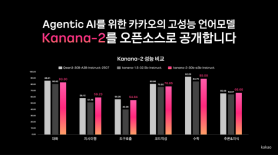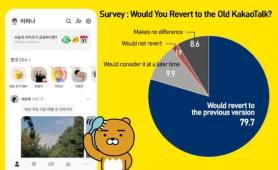
[Courtesy of Kakao]
Kakao, South Korea's second-largest web service provider, has started a beta service for its AI-based translation platform in an effort to catch up with its domestic rival, Naver. The company has been pumping up AI capabilities with new services such as AI voice assistant speaker.
The new translation service, based on "Kakao I", will provide improved results than Kakao's previous statistics-based translation service, the web service giant said in a statement on Wednesday.
The service is available on a web application for Kakao's web portal service, Daum and Kakao Talk, the country's most popular smartphone messenger app. The AI platform supports AI voice recognition technology applied to Hyundai Motor's latest luxury high-performance sedan, G70.
Kakao said the translation service is now only available for Korean-English duplex translation but it promised to support Chinese and Japanese translation soon. The company seeks to increase the accuracy of its translation service by interlocking it with an online dictionary.
Web translation services are widely used in many industries. Services based on a conventional statistical machine sometimes provide results deemed incomprehensible because they were generated on the basis of statistical models that limit parameters. AI-based translations are capable of providing more accurate and natural answers as AI learns through requests from users.
Naver is the forerunner in the domestic online translation market while the global market has been led by Google. Both support Korean-English translation services but Google is more specialized in providing professional results while Naver's are more natural.
Copyright ⓒ Aju Press All rights reserved.




